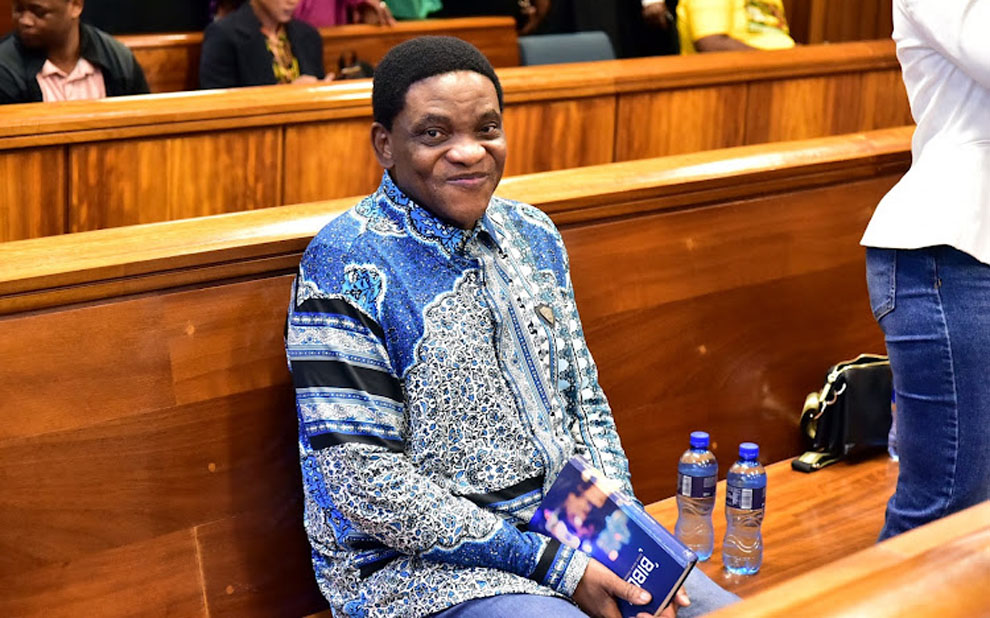metro
Herders ‘Dehumanised’ By Soldiers In Kaduna Not Bandits – Police, Community Leaders + VIDEO

-
3 killed; govt urged to tackle vigilantes’excesses
-
Sanction hospitals for rejecting patients – Experts
-
‘Victims should seek legal redress’
Community leaders and security agents in Kaduna State have dismissed a viral video which trended on Sunday insinuating that soldiers have killed and arrested some bandits in the Kakura area of Chikun Local Government Area of Kaduna State.
Daily Trust gathered that those being pushed into a military van were not bandits, but Fulani residents of a nearby community who became victims of mistaken identities when some vigilante groups attacked them while trailing bandits.
It was also gathered that after security agents rescued them, two hospitals in Kaduna rejected them even though many of them were critically injured.
Soldiers were said to have rushed them to the 44 Nigerian Army Reference Hospital where three were confirmed dead and 14 being treated.
Rising from a peace meeting among Fulani, Hausa and Gbagi natives in Kaduna yesterday, the state Commissioner of Police, Yekini Ayoku, explained that what happened in Kakura community was a case of mistaken identity following the killing of one Ishaya Karfe, the brother of the village head of Kakura.
He said bandits had tried to abduct Karfe who resisted and was shot dead.
READ ALSO:
- Lagos youth kills girlfriend, sleeps with corpse six days
- Ngige says FG not against new welfare package for lecturers, others
- Show respect, wthdraw from presidential race, Joe Igbokwe tells Osinbajo
The CP said the bandits had equally rustled some cows in a nearby Fulani settlement, adding that while members of the vigilante group from Kakura were trailing the bandits, they came in contact with the Fulani people who were trailing their rustled cows.
He said the vigilantes, being afraid that the Fulani were bandits, attacked them and it took the intervention of security agents to rescue them.
He confirmed that three Fulani residents were killed and 14 others hospitalised.
Also speaking, the District Head of Kujama under which Kakura falls, Steven Yarima Ibrahim, confirmed that those who appeared to be bundled into a military van were not bandits but members of a nearby Fulani community who were equally victims of a banditry attack.
The district head said there was a need to admonish members of the vigilante to desist from taking laws into their hands and to, instead, invite security agents when they suspect any anomaly.
The viral video
A two minutes 50 seconds video showing soldiers in military camouflage evacuating certain people into a waiting military van had emerged on Sunday. Those who posted the video had captioned it as arrested bandits who attacked Kakura community in Kaduna’s Chikun LGA.
Military men were seen beating the alleged suspects and piling them one after the other into a waiting van while they rendered insults on them. The video had captured many bystanders watching the alleged suspects who appeared to be injured as they were bundled into vehicles.
Daily Trust reports that viral video had been shared on various social media platforms and generated reactions as many commended the arrest of the suspects by security agents in Kakura community which is located near Millennium city in Kaduna.
Security, community leader douse tension
Daily Trust gathered soldiers under the leadership of the Commanding Officer, 312 Artillery Regiment, Lt Col D. O Igwilo had visited the Fulani settlement and the home of Isiaka Karfe, who was killed in Kakura, to condole them over the tragedy.
Our correspondent also gathered that soldiers who had arrived Kakura community following a distress call had been informed by the vigilante that they had arrested bandits.
Daily Trust gathered from security sources that it was after the preliminary investigations that it was revealed that the suspects were actually residents of a Fulani settlement that have lived there for over 40 years.
READ ALSO:
- MC Oluomo loyalists, NURTW members clash in Lagos over parks control
- Court fines Zenith Bank N500,000 over unsolicited messages
- Abduction: Families of missing train passengers give FG 72 hours
“The Fulani are actually not bandits, they are victims who were attacked by the vigilante on the case of mistaken identity because the people were angry that bandits had killed one of their people,” a security source said.
However, in other to douse tension, Kaduna State Government convened an emergency meeting with security and community leaders yesterday to ensure that the incident would not lead to a reprisal.
Those at the meeting include the Commissioner for Internal Security and Home Affairs, Samuel Aruwan; the state Commissioner of Police, Yekini Ayoku; Commanding Officer 312 Artillery Regiment, Lt.Col. D.O Igwilo; Chairman of Chikun Local Government, Salasi Musa; member of the state house of assembly representing Chikun, Ayuba Chawaza; District Head of Kujama, Stephen Yerima Ibrahim as well as village heads and Fulani Ardos (leaders).
Aruwan urged community leaders to step up peaceful engagements with their people so that the matter would not escalate. He assured that those in the hospital were in good care.
The Ardo of Gunduma, Ibrahim Saleh, whose people were attacked, said they had spoken to their people to calm them down that what happened was a case of mistaken identity and urged residents not to take laws into their own hands.
Govt must take action on vigilantes – Expert
Government has been urged to take action on the excesses of local vigilante to curb ethnic profiling that could lead to the killing of innocent people.
A security analyst, Awwal Abdullahi Aliyu, said the excesses of the local vigilante if left unchecked could become a major hinderance in the fight against insecurity.
“This thing has been going on for a long time most especially with the local vigilante who have no knowledge of security and administration. Thank God this time around the security agencies were involved, if not, the people would have been killed. This has been part of the challenge in the fight against crime.”
Aliyu said many communities have expressed grievances with the activities of the local vigilante and to an extent, the police adding that ethnic profiling of Fulani is a dangerous …that could escalate the country’s security situation.
“Unless the security agencies take active measures in ensuring that people arrested are being properly investigated and come to a logical conclusion that these people are criminals, no jungle justice should be taken on people.
“How many jungle justices have been committed on such people? Where their communities have not committed any crime but their properties are destroyed and they are even killed, gradually, such people start to think of how they can take vengeance and this is exactly what is happening in this country,” he said.
He called on the Kaduna State Government to sanction the hospitals that failed to save the lives of the Fulani people adding that hospitals and health workers have no right to reject any patient.
“Their responsibility is to save lives since these people have not been declared by a competent court of law as bandits and so therefore the doctors at the hospitals have no right to reject them. The doctors swore an oath to save lives and if they fail to do that, it means the hospitals needs to be sanctioned,” he said.
‘Dehumanised settlers can seek legal redress’
A security and intelligence expert, Kabiru Adamu, explained that what happened to those who were dehumanized by the military officers could worsen the security situation of the country.
READ ALSO:
- Gov Bello mourns as Makoju, former Dangote Cement MD, dies
- How gunmen killed my dad — Son of Osun APC chair
- Man arraigns for allegedly defiled friend’s two underage daughters
- Alleged N400m fraud: EFCC to re-arraign Olisa Metuh
He noted that the military officers, according to their rule of engagements, are not permitted to torture or dehumanise any suspect the way it appeared in the trending video.
According to him, the troops are only permitted to defend themselves by using their weapons or engaging the adversaries in gun duels during any attempted attack on them.
“I was one of those who condemned the video when I saw it. It is not right as far as professionalism and rule of engagement is concerned,” he said.
He, however, said that the dehumanized person should get a legal representative on their behalf to prosecute their case.
A security analyst and lawyer, Audu Bulama Bukarti, said the video was a terrible watch and a clear violation of the victims’ constitutional rights.
“The constitution and our laws are very clear that every single person arrested and of an offense however the weight of evidence against them must be treated with dignity and respect and must not be tortured.
“What we saw in this video is a clear case of violation of the dignity of human person, torture and disrespect to human beings just because they have been suspected of committing a crime or of being terrorists or bandits. And whatever the level or worth of the allegation against individuals that are arrested by security and law enforcement agencies, their constitutionally guaranteed rights cannot be violated in the way we saw in this video.
“This is most unfortunate, it is most unfortunate because the only difference I emphasize between terrorists and state forces is that state forces obey laws and have laws of engagement while territories violate laws/rules and do not have laws of engagement.
“There are many consequences for these kinds of abuses and for failure to obey rules of engagement. Number one is the fact that this would continue to soil the Nigerian army’s image in the eyes of the international community.
“It has been documented over the years how the Nigerian military violated civilians in the Boko Haram crisis and other crises across the country. This video is only going to add another instance of that kind of abuse.”
“The second key consequence is that these kinds of abuses only end up pushing the victims to the hands or to the clutches of the terrorists. A United Nations report published in September of 2017 found that 71% of young people who joined Boko Haram after the war started actually joined because of these kinds of security abuses by the Nigerian military.
“If we continued to see these kinds of abuses in the North West many more young people who are profiled, who are arrested, who are abuse in this way would join the bandits and end up fighting the Nigerian military and killing civilians because of these kinds of abuses because they want to take revenge because of these kind of abuses.
“I, therefore, call on the Nigerian military to respect the law which they seek to enforce to apply their rules of engagement and to respect the dignity of human person guaranteed by our constitution and international human rights instruments. Only these we can they show a difference between them and the terrorists and win the war against the terrorists.”
DAILY TRUST
metro
Man stabs friend over woman in FCT council

Man stabs friend over woman in FCT council
A 27-year -old man, Rabiu Suleiman, has reportedly stabbed and inflicted serious injuries on his friend, Yunusa Muazu, during a fight over a woman at Tipper garage area of Gwagwalada in Gwagwalada Area Council of the FCT.
A resident of the area, who simply gave his name as Sanusi, said the incident occurred on Tuesday night after a fight broke out at a viewing centre at Unguwar Dodo area of the town.
He said Suleiman had accused his friend, Muazu of dating his friend, Jamila Yakubu, who he intends to marry.
He said trouble started when Jamila left Suleiman’s house on Tuesday around 8:34 pm, only for him to meet her with his friend, Muazu, discussing at a viewing centre, where he had gone to watch football.
He said Suleiman, upon sighting his woman with his friend, angrily walked straight to them and slapped him, a situation, which resulted in a fight between them.
He said in the process, Suleiman allegedly pulled out a knife and stabbed his friend in the back, which attracted the attention of people at the viewing centre.
READ ALSO:
- South African court acquits Nigerian pastor of rape after 8 years in jail
- Man jailed 3 months for non-declaration of $30,000 at airport
- More heads to roll in NNPCL, subsidiaries as Ojulari assumes office
According to him, some people at the centre, who tried to separate them, were overpowered, not until when some vigilantes rushed to the scene and arrested Suleiman.
He said his friend, who was lying on the floor in a pool of his blood, was rushed to a nearby hospital.
He said the lady quietly left the scene when the fight broke out.
A member of the vigilante, Salihu Bala, who confirmed the incident, said the suspect had been arrested and handed over to security personnel in the area.
He said the vigilantes were making efforts to trace the woman’s location and arrest her.
He said, “The vigilantes even went to the family house of the girl on Wednesday morning but could not find her but we are still trailing her movement to ensure she is arrested.”
Bala said the injured victim was recuperating at the hospital, alleging that the victim and his friend were into drugs.
The spokeswoman of the FCT police command, SP Josephine Adeh, did not respond to the calls and text messages sent to her on the incident.
Man stabs friend over woman in FCT council
metro
South African court acquits Nigerian pastor of rape after 8 years in jail

South African court acquits Nigerian pastor of rape after 8 years in jail
A High Court in the Eastern Cape division of South Africa has acquitted Timothy Omotoso, a Nigerian televangelist, accused of raping young women in his church.
Omotoso and his two co-defendants were arraigned on a 32-count charge bordering on rape and human trafficking.
News24 reported that Omotoso would be deported to Nigeria immediately after the judgment.
The co-defendants are Lusanda Sulani and Zukiswa Sitho.
READ ALSO:
- More heads to roll in NNPCL, subsidiaries as Ojulari assumes office
- Barcelona beat Atletico to set up cup final against Real Madrid
- NNPCL hikes petrol pump price to N950/litre
Several young women had accused the pastor of luring them into his home in Umhlanga, a town in South Africa, where he allegedly molested them.
In April 2017, the Nigerian pastor was arrested shortly after he landed at an airport in South Africa.
He is the senior pastor of the Jesus Dominion International based in Durban, South Africa. He is also the founder of Tim Omotoso Global Outreach and Ancient of Day Broadcasting Network
According to News24, Irma Schoeman, the trial judge, yesterday, ruled that the state prosecutor did not prove the case beyond reasonable doubt.
The Nigerian pastor had been in South African prison since his arrest in 2017.
South African court acquits Nigerian pastor of rape after 8 years in jail
metro
Man jailed 3 months for non-declaration of $30,000 at airport

Man jailed 3 months for non-declaration of $30,000 at airport
Justice Deinde I. Dipeolu of the Federal High Court sitting in Ikoyi, Lagos, yesterday, convicted and sentenced Okunfulure Olusola Steve to three Months imprisonment for money laundering.
Head, Media and Publicity, Economic and Financial Crimes Commission (EFCC), Dele Oyewale, said, the convict was arrested on March 28, 2025, at the Murtala Muhammed International Airport, Ikeja, by operatives of the Nigeria Customs Service (NCS), for false currency declaration to the tune of $30,0000.
The NCS had, on Friday, March 28, 2025, handed him over to the Lagos Zonal Directorate 2 of the EFCC,Ikoyi, Lagos, for further investigations.
Consequently, he was arraigned yesterday on one-count charge bordering on money laundering.
The count reads: “That you, Okunfulure Olusola Steve, on the 28th day of March, 2025, in Lagos, within the Jurisdiction of this Honorable Court, failed to make a declaration of the sum of $20,000 to the Nigerian Customs Service at the Murtala Muhammed International Airport, Ikeja, and thereby committed an offence Contrary to and Punishable under Section 3(5) of the Money Laundering (Prevention and Prohibition) Act, 2022.”
The defendant pleaded “guilty” to the charge when it was read to him.
Following his guilty plea, prosecution counsel, C.C. Okezie called on Felicia Paul, an operative of the EFCC, to review the facts of the case.
READ ALSO:
- More heads to roll in NNPCL, subsidiaries as Ojulari assumes office
- Barcelona beat Atletico to set up cup final against Real Madrid
- NNPCL hikes petrol pump price to N950/litre
Paul, while giving details of how she knew the defendant, told the court that the NCS handed him over to the Lagos Zonal Directorate 2 of the EFCC on Friday, March 28, 2025.
Led in evidence by the prosecution counsel, Paul also told the court that the defendant was arrested with the sum of $30,000, which he failed to declare. She further told the court that “ his statement was recorded under caution and was served with the bail conditions.”
Thereafter, she identified the defendant’s statement, the handing-over note from the NCS, the arresting officer’s statement as well as the sum of $30,000 to the EFCC.
Okozie ,then sought to tender, in evidence, the documents.
Justice Dipeolu admitted and marked them as exhibits 1,2,3 and 4 and held that: “ I have read the exhibits, the statement of the defendant, and I found him guilty. He is accordingly convicted as charged.”
Okezie thereafter, prayed that the undeclared sum of $20,000 be forfeited to the Federal Government of Nigeria and that the defendant be jailed.
Defence counsel, Joel Ogundere, while addressing the court, said that the defendant,“is a first-time offender and is not aware of the disclosure policy . He is a family man and has responsibilities. His bank account shows the legitimacy of the funds.”
He also prayed the court to, “ magnanimously waive any prison sentence”, adding that the convict would not mind forfeiting the sum of money or pay a fine.
Justice Dipeolu convicted and sentenced the defendant to three months imprisonment, with effect from the date of his arrest on March 28,2025. The Judge also ordered that the money be forfeited to the Federal Government of Nigeria.
Steve, a departing passenger on Delta Airline to Atlanta, United States, had declared that he was not in possession of any money in foreign currency but in Naira, while being profiled at the Currency Declaration Desk.
However, the sum of $30,000 undeclared was found on him during a search conducted by operatives of the NCS.
He was subsequently handed over to the Lagos Zonal Directorate 2 of the EFCC for further investigations, a development that led to his arraignment and conviction.
Man jailed 3 months for non-declaration of $30,000 at airport
-

 metro2 days ago
metro2 days agoBREAKING: Senator Natasha defies restrictions, arrives homecoming rally by helicopter [VIDEO]
-

 metro2 days ago
metro2 days agoUromi: Edo residents flee towns over likely reprisal attack, arrest
-

 metro2 days ago
metro2 days agoBreaking: ‘Cancel your homecoming’ — Police tell Senator Natasha
-

 metro3 days ago
metro3 days agoHow they murdered my Kano-bound passengers in Edo
-

 metro3 days ago
metro3 days ago‘I was offered N5bn bribe to impeach Fubara’
-

 metro1 day ago
metro1 day agoBreaking: Tinubu sacks Kyari, appoints Ojulari as new NNPCL GCEO
-

 metro2 days ago
metro2 days agoAmosun, Adeola engage in verbal attack over project diversion allegation
-

 metro3 days ago
metro3 days agoKano Gov Yusuf, Sanusi linked to Eid killings













